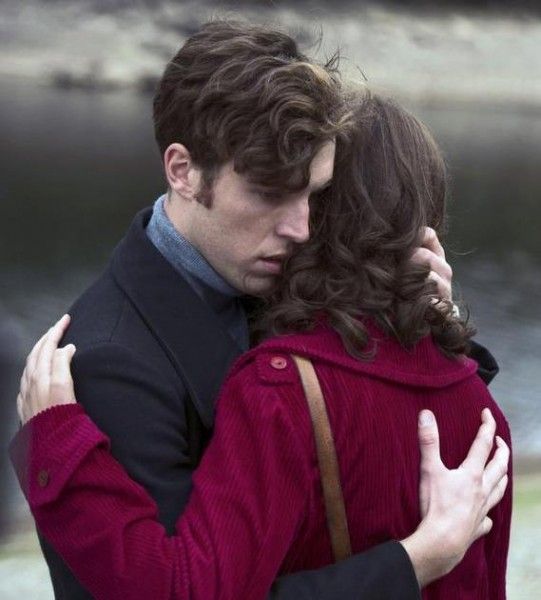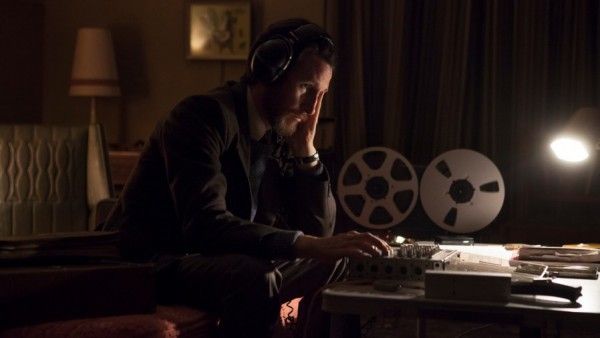"In our game, security can cost lives," says the leader of a special MI5 committee known as The Fray. The year is 1972, and the members of The Fray are anxiously attempting to work out the details of a major Soviet project of destruction, Operation Glass. The Game, a six-episode miniseries from BBC America, created by Toby Whithouse (Being Human) and directed by Niall MacCormick (Wallander), should hit all of the right notes for fans of spy thrillers, especially the kind set among the brown, gray and tweed background of the 1970s like Tinker, Tailor, Soldier, Spy. Fans of The Americans, though, might find it slow at times -- there are far fewer guns, car chases, and wigs, but a lot of British stiff upper lips. Hit the jump for why you should "watch, surmise, react."
One of the best things about miniseries like The Game is that they have a complete sense of themselves from the start. The Game opens with a fully formed objective, revolving around MI5's (an equivalent to the FBI) discovery of the mysterious Soviet project Operation Glass. But it also weaves in the personal story of a (deadly) handsome and talented interrogator, Joe Lambe (Tom Hughes), who has a personal score to settle with a KGB agent known as Odin.
All of this can feel fairly boilerplate at times, but The Game infuses these larger narratives with the smaller-scale, personal stories of the other members of The Fray, augmented by an exceptional cast who make office politics feel as high-stakes as nuclear ones. There's the leader, known only as "Daddy" (Brian Cox), who is decisive but paranoid (rightfully so). His second-in-command, Bobby Waterhouse (Paul Ritter) is already attempting to usher Daddy out so he can take over, facing enormous pressure from his overbearing mother, as well as possible fallout from the well-known "secret" of his homosexuality. Married couple Sarah (Victoria Hamilton) and Alan (Jonathan Aris) are personality opposites, and also struggle with aspects of their relationship outside of their shared work.
The series also has a running theme of disillusion about the spy game itself. Daddy, as well as a former KGB agent, both lament over the fact that the Cold War doesn't produce any heroes -- it's all about subterfuge, which is hard to make honorable. Loyalty of many kinds comes into play in almost all of the character stories, as well as the difficulty and occasional deep pain of uncovering hard truths. Additionally, The Game provides episodic arcs where the question is always about how much an asset or a target knows, and whose side they're really on. These kinds of themes are ambitious, and The Game's exploration of are worthy, although some of what happens in service of it can be sluggish.
At its best, though, The Game is sleek and stylish, and it doesn't overplay its hand as a period piece (the costumes and set pieces are not laughably outdated, but unremarkable background -- as they should be). There is some wry humor built in, like referring to the Americans as "the cousins," and Alan apologizing for his language to Daddy when he complains about him in the most British of understated ways, "Bobby Waterhouse, he really is the limit!" The overall tone is polite, restrained, and maybe even a little repressed, but The Fray react with deadly force when necessary (although their constant consideration of the value of life is refreshing -- no one is killed off without desperate cause or consequence).
The fact of its short run and clear objective should hopefully hook viewers that may not be entirely drawn in by the series' first episode. But by its third (the last one available for review), it's hard to not be entrenched in The Game's world, and curious about where it's going to end up with Operation Glass, Joe's pursuit of Odin, and the character drama in between. The job of MI5 is to watch, listen and wait, which may also be required of views. The Game, though, seems worth playing along.
The Game premieres on Wednesday, November 5th at 10 p.m. EST on BBC America.



